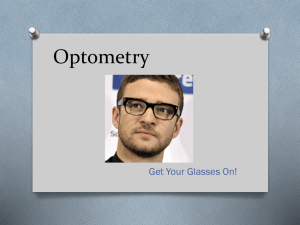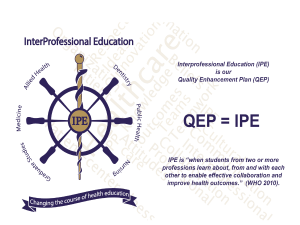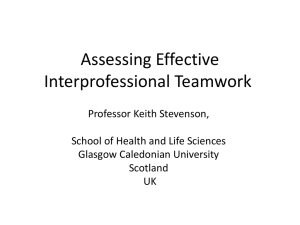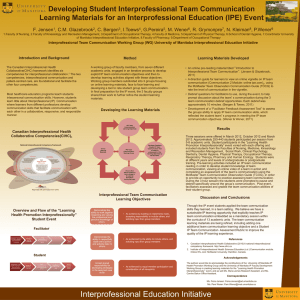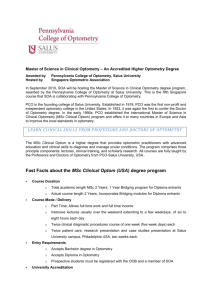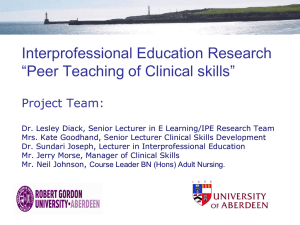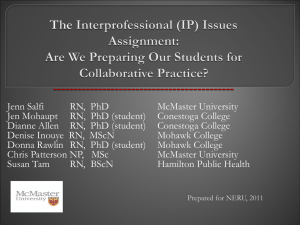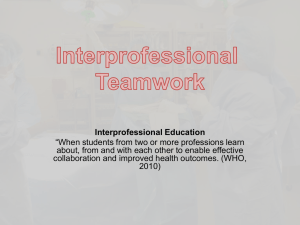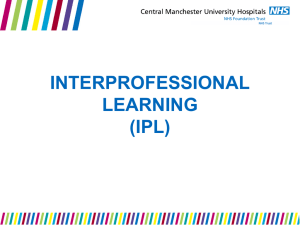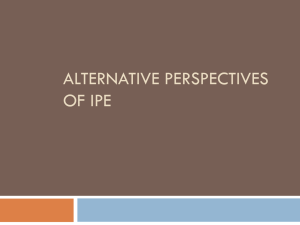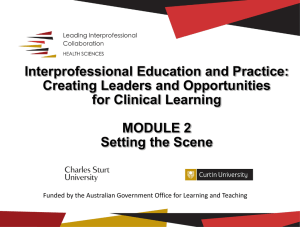here - Association of Schools and Colleges of Optometry
advertisement
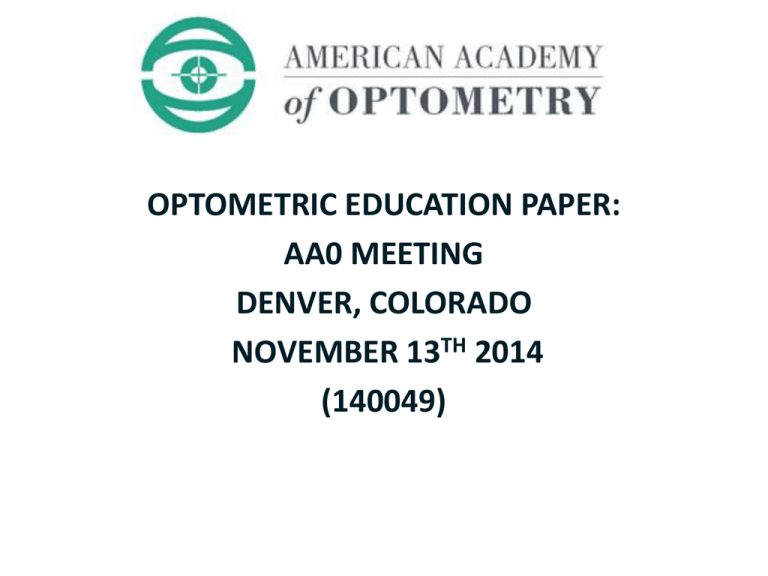
OPTOMETRIC EDUCATION PAPER: AA0 MEETING DENVER, COLORADO NOVEMBER 13TH 2014 (140049) Current Practices of Interprofessional Education at Schools and Colleges of Optometry in the US Melissa A. Vitek, OD, FAAO John Baker, OD, MSEd Jennifer Coyle, OD, MS, FAAO Elizabeth Hoppe, OD, MPH, DrPH, FAAO Interprofessional Education (IPE) Health professionals and students learning with, from and about one another to improve collaboration and the quality of patient care World Health Organization (WHO, 1988) “Multiprofessional education is not an end in itself but a means of ensuring that different types of health personnel can work together to meet the health needs of the people” …Interactive… IPEC- Interprofessional Education Collaborative (2009) First ‘Supporting Organization’ Attributes of Graduates of the Schools and Colleges of Optometry (revised 2011) Graduates are expected to have: the ability to appropriately use all resources, including the use of ancillary personnel, intra- and interprofessional collaboration, co-management and referral, in ensuring the best quality of patient care; Have a commitment to work as an integral member of the larger interprofessional health care team to improve patient care outcomes; ASCO Interprofessional education task force ‘charge’ (2013) August 2013 Surveyed twenty-one Schools and Colleges of Optometry: – Presidents/Chief Academic Officers (or designate) – Current Practices/Challenges 21 US Schools and Colleges of Optometry Participated in ASCO Survey 2013 • AZCOPT: Arizona State College of Optometry at Midwestern University • IAUPR: Inter American University of Puerto Rico School of Optometry • ICO: Illinois College of Optometry • IUSO: Indiana University School of Optometry • MCO: Michigan College of Optometry-Ferris State University • MCPHS: Massachusetts College of Pharmacy and Health Sciences School of Optometry • NECO: New England College of Optometry • NOVA: NOVA Southeastern University College of Optometry • NSUOCO: Northeastern State University Oklahoma College of Optometry • OSU: Ohio State University College of Optometry • PCO: Salus University Pennsylvania College of Optometry • PUCO: Pacific University College of Optometry • RSO: Rosenberg School of Optometry • SCCO: Southern California College of Optometry at Marshall B. Ketchum University • SCO: Southern College of Optometry • SUNY: State University of New York College of Optometry • UABSO: University of Alabama at Birmingham School of Optometry • UCB: University of California Berkley School of Optometry • UHCO: University of Houston College of Optometry • UMSL: University of Missouri -St. Louis College of Optometry • WUCO: Western University of Health Sciences College of Optometry Survey Results 19 of the 21 institutions surveyed reported participation in IPE activities Professionals Represented Optometry Dentistry Occupational Therapy Podiatry Physician Assistant Health MD Nursing Opticianry Public Physical Therapy DO Social Work Pharmacy Law Audiology Dental Hygiene Low Vision Rehab Specialist Psychology Gerontology Speech-Language Pathology Veterinary School of Health Professions Biomedical Science MS 9 PROGRAMS REPORTED A REQUIREMENT FOR IPE ACTIVITIES • • • • • AZCOPT MCPHS NECO NSUOCO PCO • • • • SCO SUNY UABSO WUCO OPTOMETRIC FACULTY PARTICIPATE IN IPE ACTIVITIES AT 18 INSTITUTIONS • • • • • • • • • IAUPR ICO MCO MCPHS NECO NOVA NSUOCO OSU PCO • • • • • • • • • PUCO RSO SCCO SCO SUNY UABSO UCB UMSL WUCO 8 INSTITUIONS REPORTED STUDENTS FROM DIFFERENT PROFESSIONS TEACHING ONE ANOTHER • • • • • • • • AZCOPT MCO MCPHS NECO PCO PUCO UABSO WUCO CASES ARE DISCUSSED IN AN INTERPROFESSIONAL ENVIRONMENT AT 12 INSTITUTIONS • IAUPR • PUCO • • • • • MCO MCPHS NECO NOVA PCO • • • • • RSO SCO UABSO UMSL WUCO EXAMPLES OF IPE COURSES • Interdisciplinary Healthcare • Basic Science (various courses) • Evidence Based Practice • Clinical Reasoning • Interprofessional Relations and Interprofessional Collaborative Practice • Interprofessional Education Series • Interprofessional Case Conference • Interdisciplinary Geriatric Care • Ethics in Healthcare • Global Health • Team-based Grand Rounds 14 REPORTED PROVIDING INTERPROFESSIONAL PATIENT CARE • • • • • • • IAUPR ICO MCO MCPHS NECO NOVA NSUOCO • • • • • • • PCO PUCO RSO SCCO SUNY UABSO WUCO 8 INSTITUTIONS REPORTED PARTNERS WITH SCHOOLS AND PROGRAMS OUTSIDE THEIR INSTITUTIONS • • • • • • • • ICO MCPHS NECO NSUOCO PCO SCCO SCO UCB Examples of IPP • Wellness clinics • Interprofessional Externship Rotations • Interdisciplinary Diabetes Eye Wellness Clinic • Interprofessional Diabetes Clinic • Hospital-based clinical programs • Hospital-based team meetings • Interprofessional Collaborative Practice Model at a health center • Community clinics • Interprofessional Collaborative Teams • Clinical affiliations with school districts and local medical groups • Clinical Core with standardized patients • Development of management plans for simulated patients • Geriatric Education Centers REPRESENTATIVES FROM 11 INSTITUTIONS PARTICIPATED IN AN IPEC SPONSORED WORKSHOP • • • • • • • • • • • AZCOPT IUSO MCO MCPHS NECO NOVA PUCO RSO UABSO UMSL WUCO Trends • Those institutions housed in Universities with other healthcare degree programs were more likely to offer formal IPE courses • Those institutions not housed in Universities with other healthcare degree programs were more likely to offer patient care oriented interprofessional activities Trends (cont’d) • Most optometric faculty involvement is on a volunteer basis • Those reporting no barriers to IPE did not report a robust IPE/IPP offering • Not a direct correlation between those attending an IPEC conference and the quantity and variety of IPE/IPP offerings 19 out of 21 Reported Participation In IPE 19 out of 21 Reported Barriers To IPE Equal number Reported both Participation in and Barriers to IPE BARRIERS TO IPE • • • • • • Lack of resources Geographical barriers Lack of time Scheduling barriers Lack of funding Lack of knowledge of first steps • Lack of trained faculty • Lack of administrative support • Cultural barriers • Lack of interest • Lack of space • Political hurdles Institution Request from ASCO • • • • • • Grant and other funding Faculty training/workshops Curriculum ideas Consulting Literature on IPE Serve as an advocate for optometric inclusion and recognition on a national level • Convene an IPE conference at a national optometric forum • Facilitate making IPE a requirement for accreditation ASCO IPE TASK FORCE HAS PLANS FOR AN IPE SUMMIT FEBRUARY 2016: SCCO at MBKU Proposed Goals: To assemble, representatives from ASCO member institutions and other champions of interprofessional collaboration Share best practices in IPE and IPP Share current practices and ideas on further development for the evaluation of the impact of IPE and IPP Jbaker@ico.edu mvitek@salus.edu QUESTIONS?
